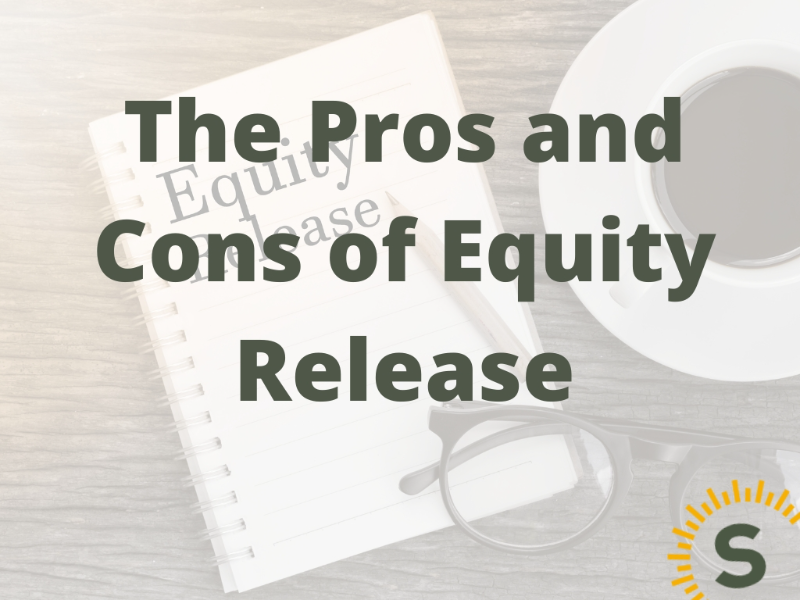
Equity Release can provide homeowners with a lump sum or regular income. It's an option for individuals who are asset-rich but cash-poor and need additional funds to supplement their retirement income or meet other financial needs.
However, many homeowners worry about the potential impact of equity release on their credit score, and that raises the question, does Equity Release affect Credit Score?
In this insight, we will explore the relationship between equity release and credit scores, understand how credit scores work, discuss the factors that can impact credit scores, and provide tips on minimising the impact on your credit score.
Equity release doesn't affect your credit score directly because it's not a loan or credit. You're not borrowing money to repay, so it doesn't impact your credit utilisation or payment history, which influences your credit score.
However, it's worth noting that the funds obtained through equity release can indirectly affect your credit score. For example, if you use the released equity to pay off existing debts, such as credit card balances or personal loans, it can positively impact your credit score by reducing your credit utilisation ratio. Additionally, if you use the funds responsibly to meet your financial obligations and make timely payments, it can help maintain or improve your credit score over time.
Equity release schemes typically require a credit check during the application process, but a poor credit score usually doesn't disqualify you. However, lenders may expect you to clear any outstanding loans, CCJs, or IVAs before receiving the released equity. Since the property serves as collateral, lenders prioritise borrowers who can repay their debts. Unlike other forms of credit, equity release doesn't require regular payments, as the lender is repaid when the property is sold after your death.
Before we delve into the impact of equity release on credit scores, let's first understand how credit scores are calculated. Credit scores are numerical representations of an individual's creditworthiness, assessing their ability to repay debts and manage credit responsibly. They are determined by credit reporting agencies using various factors, including payment history, credit utilisation, length of credit history, types of credit used, and recent credit inquiries.
The most commonly used credit scoring model is the FICO score, which ranges from 300 to 850. A higher credit score indicates a lower risk of defaulting on credit obligations, making it easier to obtain loans at favourable interest rates. Lenders use credit scores to assess the risk associated with lending to individuals and determine the terms and conditions of credit agreements.
While equity release itself may not directly impact your credit score, there are other factors that can influence it. It's important to be aware of these factors to ensure your overall financial health and maintain a favourable credit score.
Your track record of making timely payments on credit accounts, such as loans and credit cards, is a crucial factor in credit score calculations. Late payments or defaulting on obligations can significantly lower your credit score.
The amount of credit you have available compared to the amount you are using, also known as credit utilisation, plays a significant role in credit score calculations. Keeping your credit utilisation low, ideally below 30%, demonstrates responsible credit management.
The length of time you have held credit accounts is another important factor. A longer credit history can contribute positively to your credit score, demonstrating a track record of managing credit responsibly.
Having a mix of different types of credit, such as credit cards, loans, and mortgages, can positively impact your credit score. It shows that you can handle different types of credit responsibly.
Applying for new credit or having multiple credit inquiries within a short period can negatively impact your credit score. It may indicate to lenders that you are in desperate need of credit, which can be seen as a red flag.
While equity release itself may not directly affect your credit score, it's essential to adopt good financial habits to minimise any potential negative impact on your creditworthiness. Here are some tips to help you maintain a healthy credit score:
Ensure you make all your credit payments on time. Late payments can have a significant negative impact on your credit score.
Keep your credit utilisation ratio below 30% by managing your credit card balances and paying off debts in a timely manner.
Only apply for credit when necessary and avoid multiple credit inquiries in a short period. Each credit application can leave a mark on your credit report and potentially lower your credit score.
Check your credit report at least once a year to ensure there are no errors or fraudulent activities that could negatively impact your credit score. Report any inaccuracies to the credit reporting agencies.
To access your multi-agency credit report, you can use a trusted website like Checkmyfile. It's the only provider in the UK offering reports from Equifax, Experian, and TransUnion. By signing up, you can view all the information you need in one place, saving you from using multiple websites or paying separate fees. It's a convenient way to access your credit report.
To obtain your multi-agency credit report from Checkmyfile, you can take advantage of their 30-day free trial. During this trial period, you can explore your credit information from all four major credit reference agencies without incurring any charges. After the trial period, Checkmyfile charges a monthly fee of £14.99. However, you have the flexibility to cancel your account at any time if you choose not to continue using their services beyond the free trial.
While the impact of equity release on your credit score may not be a significant concern, there are other important aspects to consider before committing to this financial product. Here are a few additional considerations:
Although equity release does not require monthly repayments, the borrowed amount, including interest, will need to be repaid upon the sale of the property or the passing of the homeowner. This should be taken into account when planning for the future.
Equity release can reduce the value of your estate and the potential inheritance for your loved ones. It's crucial to discuss this with your family members and consider alternative options if preserving your estate's value is a priority.
Not everyone is eligible for equity release. Age restrictions, property value, and existing mortgage balances are some of the factors that determine eligibility. It's important to consult with a qualified equity release advisor to assess your specific situation.
If you are concerned about the impact on your credit score or have reservations about equity release in general, there are alternatives you can consider to meet your financial needs:
Selling your current property and moving to a smaller, less expensive home can release equity without the need for a specific equity release product. This can provide you with a lump sum or additional income while potentially preserving the value of your estate.
Depending on your creditworthiness and financial situation, you may be eligible for a personal loan. This can provide you with the funds you need without impacting your credit score, as long as you make timely payments.
Explore government or charitable programs that may provide financial assistance for specific needs, such as home repairs or healthcare expenses. These programs can offer support without the need for equity release.
Before making any financial decisions, especially those related to equity release, it's crucial to seek professional advice. Consulting with a qualified equity release advisor can help you understand the potential impact on your credit score and guide you through the process. They can assess your individual circumstances, discuss alternatives, and provide personalised recommendations based on your needs and goals.
So, does Equity Release affect Credit Score? Equity release itself does not directly impact your credit score. A credit check is required to apply, but a poor score won't disqualify you. If you use the equity release funds to pay off existing debts it can positively impact credit scores. Use our Equity Release Calculator without personal details to find out how much equity you can release.

Stuart is an expert in Property, Money, Banking & Finance, having worked in retail and investment banking for 10+ years before founding Sunny Avenue. Stuart has spent his career studying finance. He holds qualifications in financial studies, mortgage advice & practice, banking operations, dealing & financial markets, derivatives, securities & investments.
 No minimum
No minimum  Leyland, Lancashire
Leyland, Lancashire No obligation consultation
No obligation consultation
 No minimum
No minimum  No obligation consultation
No obligation consultation
 No minimum
No minimum  Free Consultations
Free Consultations
 No minimum
No minimum  No obligation consultation
No obligation consultation
 No minimum
No minimum  Initial fee free consultation
Initial fee free consultation
 No minimum
No minimum  Initial fee free consultation
Initial fee free consultation
 £51,000+
£51,000+  Free Consultations
Free Consultations
 No minimum
No minimum  Initial fee free consultation
Initial fee free consultation
 £101,000+
£101,000+  Bishop's Stortford, Hertfordshire
Bishop's Stortford, Hertfordshire No obligation consultation
No obligation consultation
 No minimum
No minimum  Initial or Ongoing Consultation Fees
Initial or Ongoing Consultation Fees
 No minimum
No minimum  Initial fee free consultation
Initial fee free consultation
 No minimum
No minimum  Initial fee free consultation
Initial fee free consultation
 £51,000+
£51,000+  Sheffield, South Yorkshire
Sheffield, South Yorkshire No obligation consultation
No obligation consultation
 No minimum
No minimum  No obligation consultation
No obligation consultation
 No minimum
No minimum  Newcastle-under-Lyme, Staffordshire
Newcastle-under-Lyme, Staffordshire Free Consultations
Free Consultations
 No minimum
No minimum  Free Consultations
Free Consultations
 No minimum
No minimum  No obligation consultation
No obligation consultation
 No minimum
No minimum  No obligation consultation
No obligation consultation
 No minimum
No minimum  Free Consultations
Free Consultations
 No minimum
No minimum  No obligation consultation
No obligation consultation
 No minimum
No minimum  Coatbridge, Lanarkshire
Coatbridge, Lanarkshire Initial or Ongoing Consultation Fees
Initial or Ongoing Consultation Fees
 No minimum
No minimum  Initial or Ongoing Consultation Fees
Initial or Ongoing Consultation Fees
 £21,000 +
£21,000 +  Initial fee free consultation
Initial fee free consultation
 London, Greater London
London, Greater London No obligation consultation
No obligation consultation
 No minimum
No minimum  No obligation consultation
No obligation consultation





Our website offers information about financial products such as investing, savings, equity release, mortgages, and insurance. None of the information on Sunny Avenue constitutes personal advice. Sunny Avenue does not offer any of these services directly and we only act as a directory service to connect you to the experts. If you require further information to proceed you will need to request advice, for example from the financial advisers listed. If you decide to invest, read the important investment notes provided first, decide how to proceed on your own basis, and remember that investments can go up and down in value, so you could get back less than you put in.
Think carefully before securing debts against your home. A mortgage is a loan secured on your home, which you could lose if you do not keep up your mortgage payments. Check that any mortgage will meet your needs if you want to move or sell your home or you want your family to inherit it. If you are in any doubt, seek independent advice.